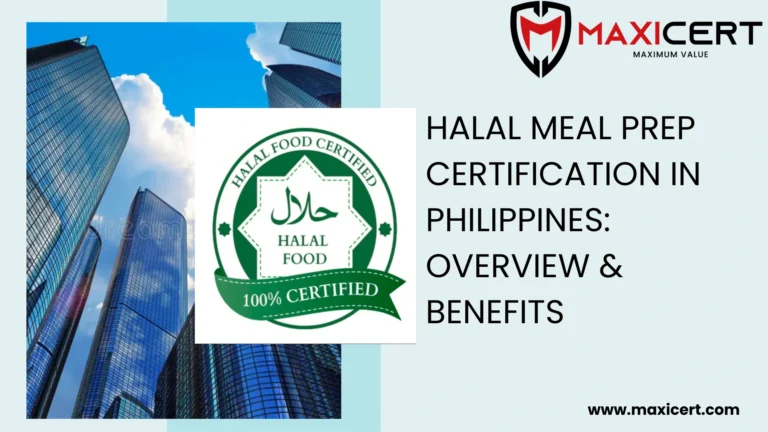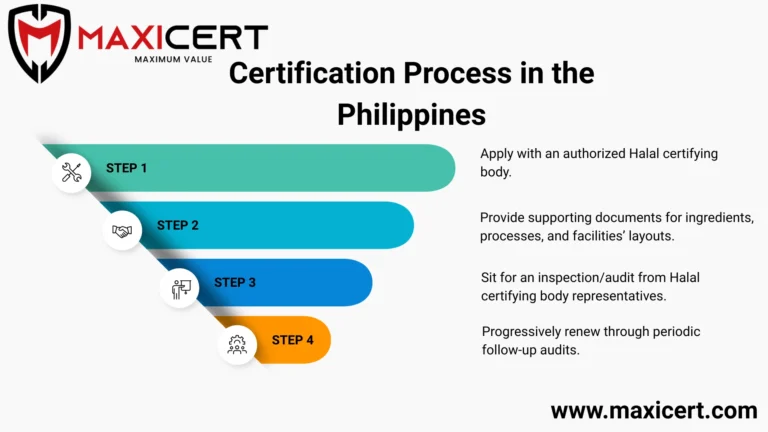HALAL MEAL PREP Certification in Philippines: Overview & Benefits

Introduction
Looking to start offering meal preparation services for consumption in the Philippines? The Halal Meal Prep Certification guarantees the compliance of your meals with Islamic dietary laws, simultaneously increasing consumer confidence and trust, growing your market, and bringing your kitchen to international (or rather, intercontinental) Halal standards. In this article, we explain all of the necessary steps to get certified and how Maxicert can assist you.
With an increase in consumers, especially those from the Muslim community, seeking Halal-certified meal options, there is a gap in the market waiting for you to fill it. Operating a meal subscription service, cloud kitchen, or catering business? You could gain a competitive edge and strengthen brand loyalty by obtaining the Halal Meal Prep Certification.
What is Halal Meal Prep Certification?
Halal is an Arabic word which translates to “permissible” or “lawful,” within the context of Islamic law. Regarding meal preparation, to be granted Halal certification means that the food products, ingredients, and processes are rigorously checked and verified to be compliant with Islamic laws.
Your potential customers are guaranteed with this certification, particularly Muslims, that the meal prep service:
- Halal certified ingredients are used,
- Good hygiene and food safety standards are practiced,
- Avoidance of cross-contamination with Haram (prohibited) items such as pork or alcohol is guaranteed.
Read More about Halal Meal Prep Certification
Request A Free Quote
The Importance of Halal Meal Prep Certification in the Philippines
Alongside the growing global food market, the Philippines has a rising Muslim population. Because of this, Halal compliance is becoming more important.
Main Reasons To Obtain The Certification:
- ️️ Gain access to fast emerging domestic and international markets for halal food
- ️ Enhance reputation among Muslim consumers
- Expand businesses to Muslim-majority countries
- Follow the local food industry regulations and Halal requirements
Who Needs Halal Meal Prep Certification?
This certification applies to:
- Islamic and health-focused meal prep companies or services.
- Food delivery or cloud kitchen services
- Caterers, restaurants, and those offering meals by subscription
- Firms looking for a foreign market, especially SMEs
Whether you are a solo or part of a big brand, customer confidence is enhanced with certification.
Recognized Halal Certifying Bodies:
- Islamic Da’wah Council of the Philippines (IDCP)
- Halal Development Institute of the Philippines (HDIP)
- Other bodies accredited by NCMF or Department of Trade and Industry (DTI)
Certification Process in the Philippines

Criteria For Obtaining Halal Meal Preparation Certification
A business in the Philippines must accomplish the following prerequisites to obtain Halal certification:
Facility Requirements
- Separate zones for the storage and preparation of Halal foods.
- Surfaces and utensils must be cleaned and sanitized properly.
- Strict hygiene compliance — no cross HARAM contact zones.
Ingredient Compliance
- Halal-certified meat, poultry, and processed products are to be used.
- Non-use of non-Halal alcohol-based ingredients or additives.
Staff Training & Documentation
- Allegiance to Halal protocols is a must for all employees.
- Proper documentation for audits and inspections must be kept.
Advantages of a Halal Meal Preparation Certification
1. Increased Trust from Consumers
- Your meals are perceived to be untainted and to be of high quality.
- Enhances business image as accountable and open to scrutiny.
2. Breaking Into New and International Markets
- Gain access to Muslim-majority countries with strict Halal import regulations.
- Serve niche local markets that are often ignored by mainstream suppliers.
3. Meeting Regulatory Requirements
- Streamlines the process of exporting food to halal compliant nations.
- Supports some government policies such as those from NCMF and DTI.
4. Strategic Marketing Position
- Promote your business with Halal logo/certification in all channels of advertisement.
- Provides additional advantage over other un-certified meal preparation services.
Learn more about ISO Services by Maxicert.
Common Mistakes to Avoid
In your pursuit towards certification, beware of these common mistakes:
- Using non-Halal or improperly sourced ingredients
- Storing Halal and non-Halal items together
- Inadequate training or awareness among staff
- Skipping documentation and traceability procedures
Cost and Timeline for Certification
Estimated Costs:
- Strategically varying based on business size, number of facilities, and complexity of the menu
- Starting from a few thousand pesos to moderate fees for larger operations
Timeline:
- Application to final approval can take 2–6 weeks based on readiness and inspection scheduling.
- Annual renewals or slsurveillance audits may apply
How Maxicert Can Help You Get Certified
Maxicert aims to streamline the certification process for your meal prep business by walking you through every step of the process.
Why Choose Maxicert?
- One-on-One Consultation with Halal experts
- Compliance guaranteed through audit preparation from day 1
- Streamlined interaction with Halal Authorities for seamless certification
- Competitive, thorough, and clear pricing
- Post-certification support for renewals, updates, and expansion tasks
Countless food businesses have received Halal certification through our services at Maxicert, along with trustable value from consumers.
Common Misconceptions about Halal Meal Prep Certification
- Only Muslim-owned businesses can apply for Halal certification
→ Fact: Any business, regardless of owner’s religion, can apply. Halal certification is not exclusive to Muslim-owned businesses. - Halal certification is only needed for meat products
→ Fact: All ingredients, even sauces, oils, and the methods used for processing them, must comply to Halal standards. - Halal and organic/vegan mean the same thing
→ Fact: While organic and vegan are dietary choices, Halal is based on religious instructions. - Getting Halal certified is expensive and complicated
→ Fact: The process becomes simple and affordable with expert guidance, such as from Maxicert.
Conclusion
Halal Meal Prep Certification occupies a unique position of a business enhancer and a religious rite. The certification fosters trust, boosts meal prep quality, and attracts a larger audience in the region and beyond. It does not matter if you operate a single kitchen or an expanding food delivery company; receiving Halal certification reflects your dedication to moral business operations and embracing diversity.
Would you like to advance your meal prep services further?
Maxicert offers a one-stop-shop solution for your meal prep certification — offering everything from initial consultation to receiving the halal certificate.
Contact Maxicert today and receive a free consultation to transform your business easily and smartly into a Halal compliant model.

Get In Touch

Get In Touch

Get In Touch
Need A Free Estimate?
Get a free consultation and Checklist to get certified for ISO , HALAL, CE Mark Certification.
FAQ
Is there a need for Halal certification in the Philippines?
While it is not necessary, it is important for people aiming at Muslim clientele or for markets that require Halal.
Is it possible for non-Islamic businesses to apply for a Halal certificate?
With the right practices and guidelines in place, yes.
How long is the certification period?
Depending on the business type, most certifications are valid for 1 year and need renewal through audits.
Is the certification applicable to online meal delivery services?
Absoloutely. Any food business, whether online or offline, can take advantage of Halal certification.
Is it possible to provide both Halal and non-Halal meal prep options from the same kitchen?
It is allowed, provided there is thorough separation of storage, prep areas, cooking equipment, tools, as well as in documentation.





